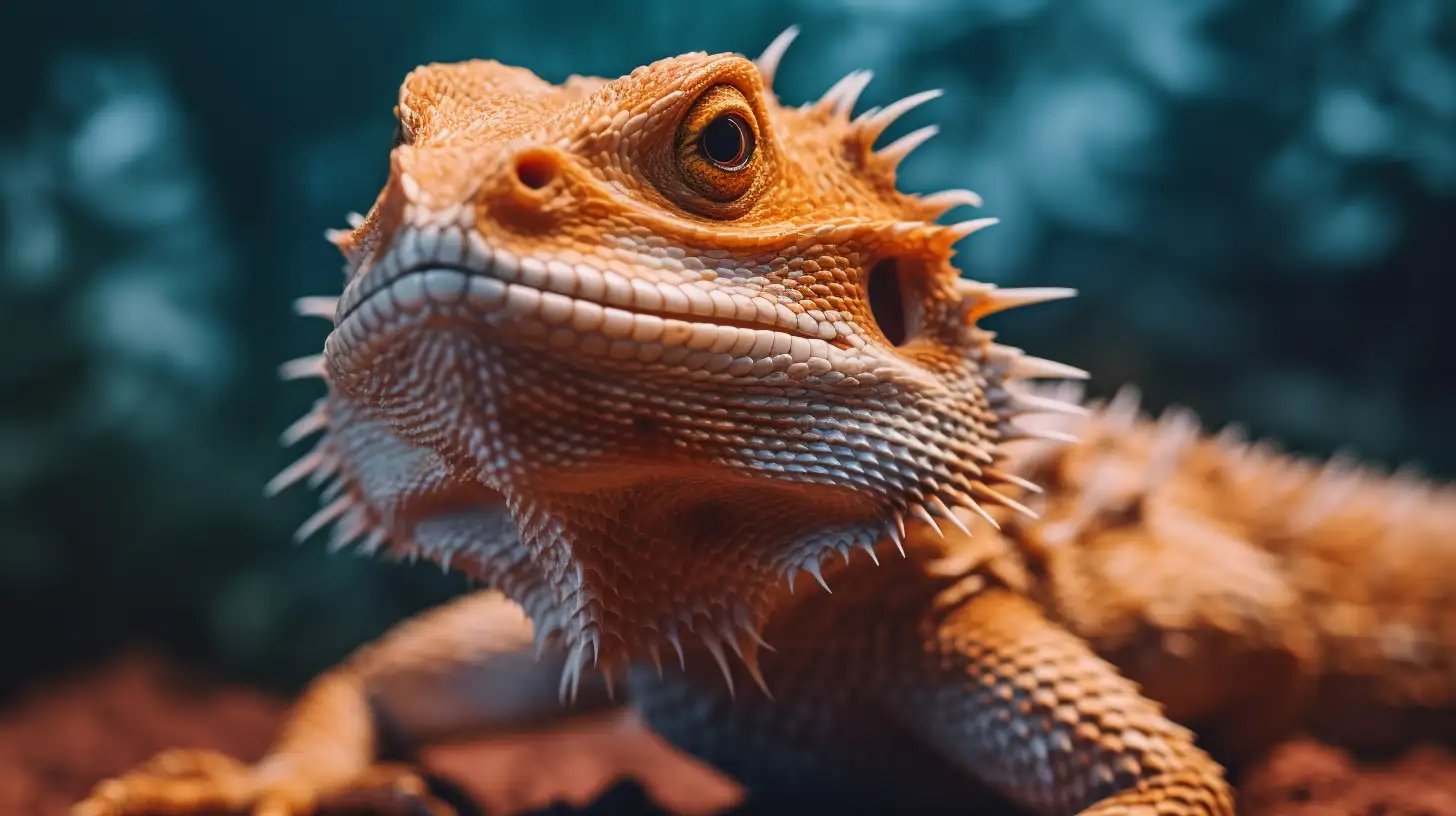Table of Contents
Have you ever wondered, “What vegetables can a bearded dragon eat?” You’re not alone! Providing a balanced diet is an essential part of taking care of pet reptiles , ensuring they live a long and healthy life. This comprehensive guide will delve deep into the types of vegetables that are safe and beneficial for your scaly friend’s diet.
, ensuring they live a long and healthy life. This comprehensive guide will delve deep into the types of vegetables that are safe and beneficial for your scaly friend’s diet.
The Role of Vegetables in the Diet
Providing your pet with a diverse diet is crucial, and vegetables play a vital role in fulfilling this requirement. But why are vegetables so important, and how do they fit into the overall dietary scheme?
Nutritional Benefits
Vegetables are packed with necessary vitamins, minerals, and fiber that aid in the reptile’s digestion and overall well-being. They are an excellent source of calcium, a crucial nutrient needed for strong bones and a healthy skeletal structure.
Proportions of Diet: Vegetables vs Insects
While insects are a vital protein source in a bearded dragon’s diet, vegetables should constitute a significant portion, too. For younger dragons, a diet consisting of 80% insects and 20% vegetables is recommended. As they start maturing, the proportions should shift to around 50% insects and 50% vegetables, reflecting their natural diet in the wild. Fully grown adults should eat around 80% vegetables and 20% insects.
Understanding Nutrient Requirements
Knowing what your lizard  needs in its diet is half the battle. Here, we explain the vital nutrients your pet needs and how to ensure they are getting them.
needs in its diet is half the battle. Here, we explain the vital nutrients your pet needs and how to ensure they are getting them.
Importance of Calcium and Vitamins
Calcium is essential for bearded dragons to prevent metabolic bone disease, a common health issue. Equally important are vitamins, particularly Vitamin A and D3, which are crucial for their immune system and calcium absorption.
Impact of Fiber and Hydration
Vegetables are an excellent source of dietary fiber, which aids in digestion, and water, which helps to keep your pet hydrated. Hydration from fresh vegetables is especially beneficial as some bearded dragons do not readily drink standing water.
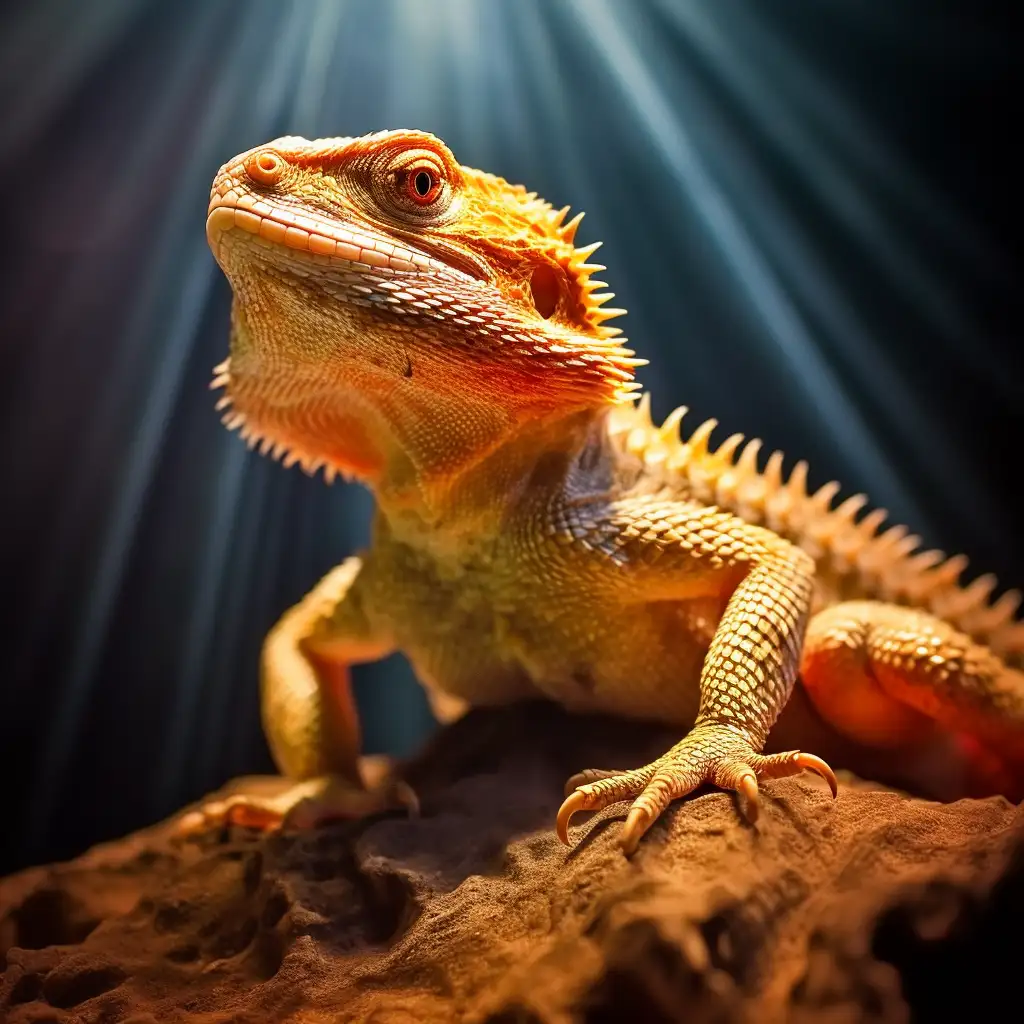
Use of Supplements in Bearded Dragon’s Diet
Even though a well-balanced diet of vegetables and insects can cover most of the nutritional needs of a bearded dragon , there are situations when dietary supplements may become necessary. Such cases often arise due to the pet’s specific health circumstances or to enhance the nutritional value of their diet, ensuring your reptile friend maintains optimal health.
, there are situations when dietary supplements may become necessary. Such cases often arise due to the pet’s specific health circumstances or to enhance the nutritional value of their diet, ensuring your reptile friend maintains optimal health.
Essential Supplements
The most common supplement in a bearded dragon’s diet is calcium. Calcium supplementation is critical because calcium deficiencies can lead to serious conditions, such as metabolic bone disease. Sprinkle a bit of calcium powder on their meals a few times per week.
Next, consider multivitamins. These supplements contain a blend of essential vitamins and minerals that your bearded dragon may not get enough of from their food, including crucial elements like vitamin A and D3. Be mindful though; these supplements should be given less frequently than calcium, typically once a week, to prevent hypervitaminosis, a condition caused by excessive vitamin intake.
Choosing the Right Supplements
When choosing supplements, it’s essential to consider their quality and their ingredients. Always go for products specially formulated for reptiles. Also, take note of the presence of Vitamin D3 in calcium supplements, as this vitamin aids in the absorption of calcium.
Applying Supplements
Applying supplements to your bearded dragon’s diet is relatively simple. Typically, the supplement comes in a powder form that can be sprinkled over their food. A common method is the ‘shake and bake’ approach, where you place the food and supplement powder in a bag, shake it up, and serve it to your pet.
Final Note
Remember, while supplements can be beneficial, they shouldn’t replace a balanced diet. Instead, they should be used to enhance your bearded dragon’s diet and fill in any potential nutritional gaps. As with any changes to your pet’s diet, introducing supplements should be done gradually and under the guidance of a trusted veterinarian to ensure their well-being.
No products found.
A List of Suitable Vegetables
“What vegetables can a bearded dragon eat?” really is a common question for newbie beardie owners. To that end, here’s a comprehensive list of safe and healthy choices.
Leafy Greens: Mustard Greens, Collard Greens, and Dandelion Leaves
Leafy greens should make up the bulk of the vegetable portion in your bearded dragon’s diet. Mustard greens, collard greens, and dandelion leaves are all excellent choices as they are high in calcium and other nutrients.
Other Vegetables: Bell Peppers, Squash, and Cucumbers
Bell peppers are packed with vitamins and can add a splash of color to your pet’s food, attracting their attention. Squash, both summer and winter varieties, offer great nutritional value. Cucumbers, while not as nutritionally dense, can provide hydration due to their high water content.
Here’s a comprehensive table of vegetables that bearded dragons can and cannot eat:
| Vegetables Bearded Dragons Can Eat | Frequency | Comments | Vegetables Bearded Dragons Cannot Eat | Reason |
|---|---|---|---|---|
| Collard Greens | Daily | High in calcium, good source of fiber | Spinach | High in oxalates, binds with calcium |
| Mustard Greens | Daily | Good source of calcium and vitamins | Beet Tops | High in oxalates |
| Dandelion Leaves | Daily | High in calcium, vitamins A and C | Lettuce (Iceberg) | Little nutritional value, can cause diarrhea if overfed |
| Bell Peppers | Every Other Day | Rich in vitamins A, C, and K | Rhubarb | Contains oxalic acid, which is toxic |
| Squash (Summer and Winter) | Daily | Packed with vitamins and minerals | Broccoli | Can cause bloating, feed sparingly |
| Cucumbers | Occasionally | High water content, can aid in hydration | Cabbage | Can cause bloating, feed sparingly |
| Butternut Squash | Daily | Good source of vitamins A and C, and fiber | Onions | Can cause digestive upset |
| Carrots | Occasionally | High in vitamins A and C, but feed in moderation due to high sugar content | Avocado | Contains persin, which is toxic |
| Zucchini | Daily | Good source of vitamin C, magnesium, and dietary fiber | Mushrooms | Lack nutritional value, potential for toxic varieties |
Please note, the “Frequency” column suggests how often a bearded dragon can safely consume each vegetable. However, a varied diet is crucial for your pet’s health. It’s best to mix and match different vegetables throughout the week to provide a balanced diet. Always consult with a reptile-savvy veterinarian for personalized dietary advice.
How to Prepare Vegetables for Bearded Dragons
Preparing vegetables for your bearded dragon isn’t too different from preparing them for your own meals. There are a few simple steps that can help ensure that the vegetables are safe, easy to eat, and full of nutritional value.
First, always remember to thoroughly wash the vegetables. Like us humans, bearded dragons are susceptible to pesticides and other chemicals often found on the skins of fruits and vegetables. Washing helps remove these harmful substances and ensures that your pet is consuming only the nutritious part of the veggie.
Next, consider peeling some vegetables. Certain vegetables have tough skins that might be difficult for your bearded dragon to chew or digest. For example, squash is a beneficial vegetable for bearded dragons but its skin can be tough. Therefore, peeling it can help your bearded dragon enjoy the meal without any discomfort. It also ensures that your pet doesn’t consume any wax or other chemicals that might be on the skin of the vegetable.
Cutting the vegetables into small, manageable pieces is also important. Bearded dragons can choke on large pieces of food, so it’s recommended to cut the veggies into pieces no larger than the space between your pet’s eyes. This rule of thumb ensures that the pieces are small enough to swallow safely.
Lastly, although bearded dragons generally consume raw vegetables, there may be times when you need to cook the vegetables lightly. For example, some harder vegetables like butternut squash might be more palatable and easier to eat if they’re slightly cooked. However, avoid adding any seasoning or oil, and let the veggies cool before serving.
Organic vs. Non-Organic Vegetables
When deciding between organic and non-organic vegetables for your bearded dragon’s diet, there are several factors to consider.
Nutritional Value
The first question many pet owners ask is whether there’s a significant difference in the nutritional value between organic and non-organic vegetables. The consensus among scientists is that the nutrient content is largely similar between the two. However, some studies suggest that organic produce may contain slightly higher levels of certain vitamins and minerals.
Pesticide Residue
One of the primary reasons pet owners opt for organic vegetables is to avoid pesticide residues. Conventional farming often uses synthetic pesticides, which can leave residues on produce. While these levels are regulated and deemed safe for human consumption, the effect of these residues on smaller animals like bearded dragons is less well studied. Organic farming, on the other hand, limits the use of synthetic pesticides.
Taste and Texture
The impact of organic versus non-organic produce on the taste and texture of the vegetables is subjective. Some bearded dragon owners report that their pets seem to prefer one over the other, but this can vary widely between individual animals.
Cost Considerations
Organic vegetables generally cost more than non-organic counterparts due to the costlier farming practices and certification process. Whether the added expense is worth it depends on individual circumstances. If the budget is tight, non-organic vegetables, thoroughly washed, can still provide a balanced diet for your bearded dragon.
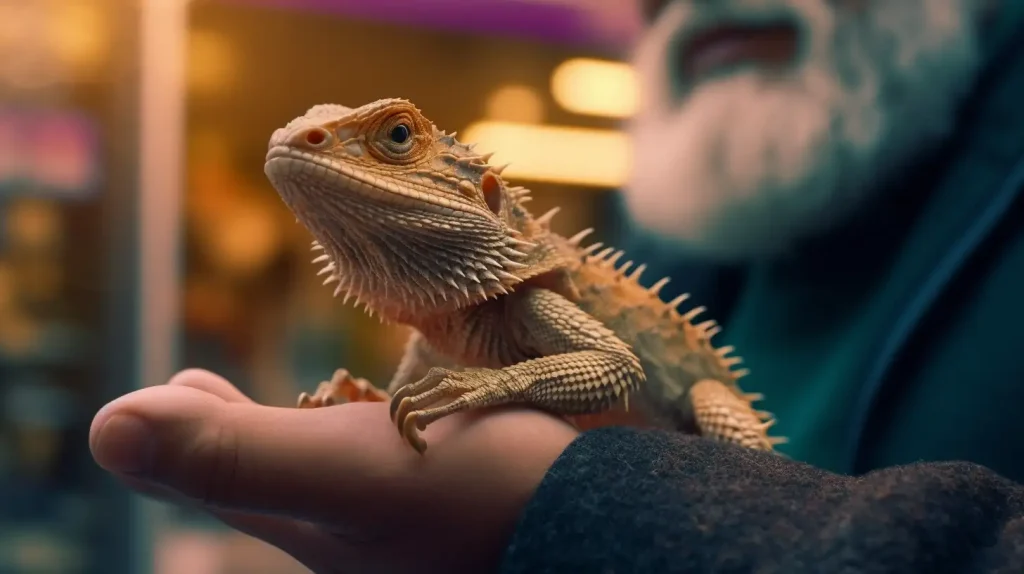
A List of Vegetables to Avoid
While many vegetables are safe for bearded dragons, there are some to avoid due to their high oxalate content or other harmful substances.
Reasons for Certain Vegetables Being Unsuitable: Lettuce, Spinach, Rhubarb
Lettuce, although not toxic, offers little nutritional value and can cause diarrhea if fed in excess. Spinach and rhubarb are high in oxalates which can bind with calcium and lead to deficiencies.
Feeding Schedule and Portions
Knowing when and how much to feed your pet is as crucial as knowing what to feed them. Here are some guidelines:
Frequency of Feeding Vegetables
Younger bearded dragons should have access to suitable vegetables daily, though their primary interest will be in insects. Adults should be fed vegetables every day, with insects offered 2-3 per week.
Portion Sizes and Appropriate Chopping Sizes
The size of vegetable pieces should correspond to the size of your pet’s eyes – this helps to prevent choking. A good mix of different vegetables, cut into small, manageable pieces, will ensure a balanced diet.
Age-specific Feeding Instructions
As your bearded dragon matures, its diet shifts from primarily insect-based to a balanced mix of insects and vegetables. Therefore, the portion of vegetables in their diet should gradually increase with age.
Safe Treats and Their Frequency
Understanding Treats for Bearded Dragons
When we speak about ‘treats’ in the context of bearded dragon care, we’re referring to food items that can be offered occasionally to add a bit of variety and enrichment to their diet. Treats are not meant to replace the staple elements in a bearded dragon’s diet, such as the essential vegetables and insects, but can provide extra nutrients and a delightful change of pace for your scaly companion.
Safe Treats to Offer
Bearded dragons can enjoy a variety of fruits as treats, but keep in mind that these should not make up more than 10% of their overall diet due to their high sugar content. Examples of safe fruits to offer include peaches, apples (be sure to remove seeds), pears, melons, and berries like strawberries and blueberries.
as treats, but keep in mind that these should not make up more than 10% of their overall diet due to their high sugar content. Examples of safe fruits to offer include peaches, apples (be sure to remove seeds), pears, melons, and berries like strawberries and blueberries.
There are also certain vegetables which, while safe, should be given sparingly due to their higher amounts of certain nutrients. For instance, spinach is rich in calcium, but it also contains oxalates, which can inhibit calcium absorption if fed excessively.
Frequency of Treats
The frequency of giving treats depends on the age of your bearded dragon. Younger dragons require a higher protein intake for growth, so it’s best to limit fruits to a very occasional treat. For adult bearded dragons, offering fruit as a treat once or twice a week is a good rule of thumb.
Remember, the aim is to keep their diet varied and balanced. It’s easy to overdo treats because we love to see our pets excited and happy. However, too many treats can cause nutritional imbalances and obesity, leading to health problems.
Portion Size and Preparation
When giving treats, a good guideline to follow the above mentioned “eyeball rule.” Essentially, the piece of fruit or treat should be no larger than the space between the bearded dragon’s eyes. As for preparation, always thoroughly wash the fruit, remove any seeds or pits, and cut it into suitably small pieces.
How to Introduce New Vegetables
Introducing new vegetables into your bearded dragon’s diet should be done carefully to ensure they accept these changes positively.
Gradual Introduction Methods
When adding new vegetables to the diet, start by mixing small amounts with their current food. Gradually increase the amount of new food as your pet gets used to it.
Observing Reactions to New Food
Watch your pet closely when introducing new food items. If your pet reacts negatively or seems uninterested, don’t force it. Try again another time or try a different vegetable.
What to Do in Case of a Negative Reaction
If your pet has a negative reaction to a new food, such as vomiting, diarrhea, or refusal to eat more, remove that item from their diet and consult a veterinarian.
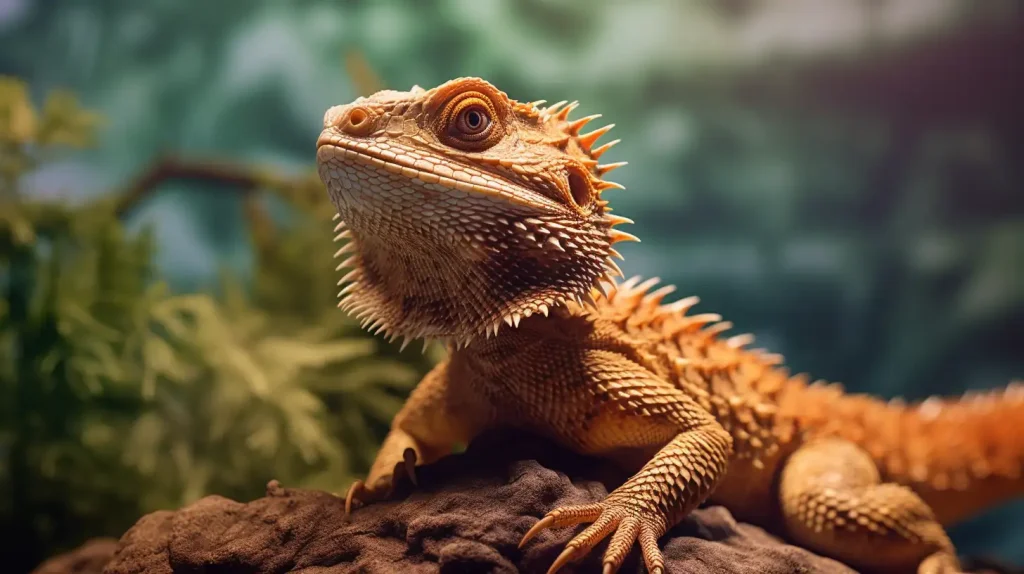
Signs of Nutritional Deficiency or Overfeeding
Observing your bearded dragon’s behavior and physical appearance can provide essential clues about their health status. Nutritional deficiencies or overfeeding can lead to a series of health issues, which can often be detected early by watchful pet owners.
Nutritional Deficiencies
A well-balanced diet is paramount for your bearded dragon’s health and longevity. If your beardie isn’t receiving the necessary nutrients, several symptoms might manifest. Signs of nutritional deficiencies might include lethargy, decreased appetite, and slow growth. Additionally, issues such as weight loss, sunken eyes, and poor skin coloration could be indicators of a potential problem.
One common health issue that arises from calcium deficiency is metabolic bone disease (MBD), characterized by softened bones, general weakness, and in severe cases, twisted or fractured limbs. Similarly, Vitamin A and D3 deficiencies can lead to poor immune response, eye problems, and issues with calcium absorption, respectively.
(MBD), characterized by softened bones, general weakness, and in severe cases, twisted or fractured limbs. Similarly, Vitamin A and D3 deficiencies can lead to poor immune response, eye problems, and issues with calcium absorption, respectively.
Overfeeding
On the other end of the spectrum, overfeeding your bearded dragon can also result in significant health problems. Bearded dragons are opportunistic eaters and will often consume food whenever it’s available, making them susceptible to overeating.
Key signs of overfeeding include rapid weight gain and excessive growth. Moreover, obesity can lead to fatty liver disease, heart disease, and a reduced lifespan. If your bearded dragon appears significantly larger around the belly, is less active, or shows difficulty moving, these could be signs of obesity. Overfeeding insects can also lead to protein overload, which could potentially result in gout or kidney disease.
Balancing the diet of your bearded dragon is crucial, and understanding these signs can help you act promptly to address any issues. Adjusting the diet or consulting with a vet are the first steps towards rectifying nutritional imbalances.
Possible Health Issues from Wrong Diet
A bearded dragon’s dietary health is no laughing matter. Much like humans, these reptiles can develop a range of health issues if fed a poor diet. We’ve always heard the saying, “you are what you eat,” right? Well, the same holds true for our dragons.
Metabolic Bone Disease
Metabolic bone disease is, unfortunately, one of the most common health problems seen in captive bearded dragons. It’s primarily caused by an imbalance in calcium, phosphorous, and Vitamin D intake. Vegetables high in calcium are your friend here, but if your bearded dragon is gobbling down too many phosphorous-rich foods (or foods with a poor calcium-to-phosphorous ratio), calcium absorption can be inhibited, leading to MBD. Signs to look out for include weak jawbones, lethargy, soft bones, and a noticeable lack of appetite.
Impaction
Impaction is a medical condition where your bearded dragon’s intestinal tract is blocked, often due to undigested food or substrate. This can be a serious problem, potentially requiring medical intervention. It’s crucial to make sure the veggies you’re feeding your bearded dragon are appropriately sized (remember the eye-size rule!) and thoroughly chewable to help prevent this issue.
Nutrient Deficiencies
As we touched upon earlier, bearded dragons need a balanced diet to thrive. Without the right amounts of crucial vitamins and minerals, they can suffer from various deficiencies. A lack of vitamin A, for example, can result in poor vision, skin problems, and reduced appetite, while a deficiency in vitamin D3 can inhibit calcium absorption, resulting in a risk of MBD.
Oxalate Issues
Some vegetables, such as spinach and rhubarb, contain high levels of oxalates – these are compounds that bind with calcium and prevent it from being absorbed by the body. When too many oxalate-rich foods are consumed, your bearded dragon could be at risk of calcium deficiency, which, as we know, could lead to MBD.
Maintaining a watchful eye on your bearded dragon’s diet and behavior is fundamental to their health. If you notice any changes or suspect a health problem, it’s always best to consult with a professional as soon as possible. Remember, a nutritious, well-balanced diet is key to ensuring your scaly friend lives a happy, healthy life.
No products found.
The Importance of Variety
Feeding your bearded dragon a variety of vegetables not only meets their nutritional needs but also keeps them interested in their food.
Avoiding Food Boredom and Promoting Balanced Nutrition
Just like humans, bearded dragons can get bored with the same food daily. Offering a mix of different vegetables will ensure they get a balanced diet and keep their interest.
Seasonal Variation in Vegetable Choices
Spring Vegetables
As we welcome the fresh breeze of spring, you’ll find an abundance of leafy greens in the market, perfect for your bearded dragon. Options like mustard greens, collard greens, and dandelion leaves, which are all excellent choices, become widely available. These are high in calcium and other essential nutrients. Don’t forget about bell peppers as they start to come into season, providing a rich source of vitamins and a splash of color to your pet’s food.
Summer’s Bounty
With the arrival of summer, a new variety of vegetables come into play. Zucchini and summer squash, both excellent sources of nutrition, become readily available. Cucumbers, while not as nutritionally dense, can provide much-needed hydration due to their high water content, making them an ideal choice during the hotter months. It’s an excellent time to introduce these items into your dragon’s diet.
Autumn Harvest
As we shift into autumn, the availability of certain vegetables changes. Winter squash starts to appear, offering similar nutritional value to their summer relatives, and a great addition to your pet’s diet. Fall bell peppers, though not as vibrant as their spring counterparts, still provide a decent amount of vitamins.
Winter Vegetables
Winter doesn’t offer as much variety in fresh produce as other seasons, but you can still find a good range of suitable vegetables. Root vegetables such as carrots and turnips can be safely added to your bearded dragon’s diet in moderation due to their higher sugar content. Don’t forget about dark, leafy greens like kale, which are available year-round and should form a staple part of your bearded dragon’s diet.
Always remember that a varied diet is not only nutritionally beneficial but also keeps your dragon interested in their food. By taking advantage of the seasonal variation in vegetable choices, you can ensure your bearded dragon enjoys a diverse and nutritionally balanced diet all year round.
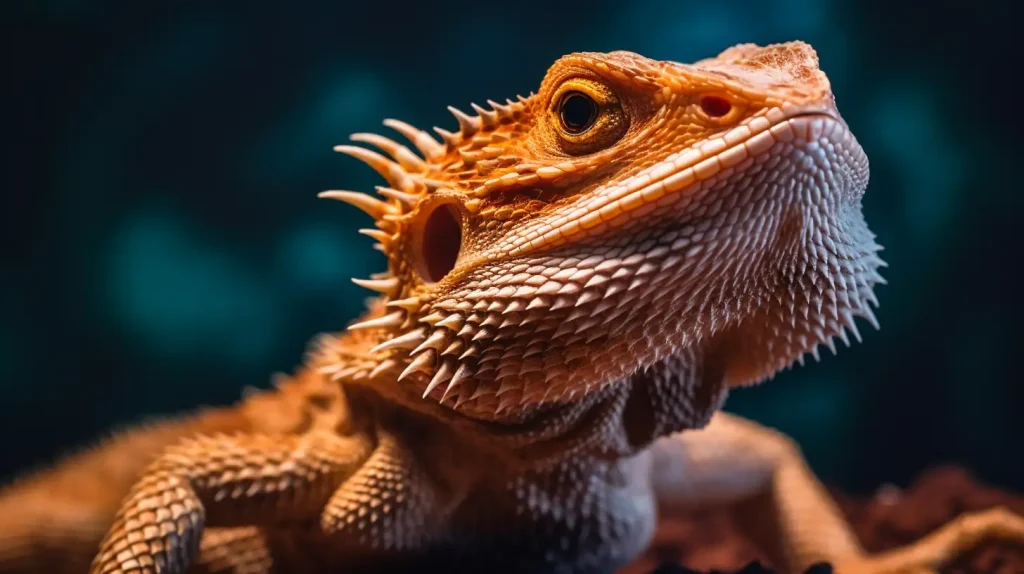
Common Myths and Misconceptions
With so much information available, it’s easy to get confused. Let’s debunk some common myths about what vegetables a bearded dragon can eat.
Debunking Misunderstandings Around Diet
Some believe that bearded dragons can survive solely on an insect diet, but this isn’t true. As they mature, they need a balanced diet of both insects and vegetables to meet their nutritional requirements.
Consulting a Veterinarian for Diet Planning
While there’s plenty of general information out there, there’s no one-size-fits-all when it comes to the dietary needs of your bearded dragon. Like humans, each bearded dragon is unique and can have different nutritional requirements based on factors such as age, health, and lifestyle. That’s why it’s essential to personalize your pet’s diet plan for their specific needs.
Why Involve a Veterinarian in Diet Planning?
Veterinarians who specialize in reptile health have the expertise and experience to provide comprehensive diet advice tailored to your pet. They’ll consider all the crucial factors like your dragon’s age, current health status, and even unique behaviors. For example, some bearded dragons may prefer certain vegetables over others, or maybe they need special supplements due to a health condition.
Benefits of Personalized Diet Planning
A tailored diet plan ensures that your bearded dragon gets the right amount and variety of nutrients needed for optimal health. By consulting with a vet, you can also get guidance on how to introduce new foods to your pet, adjust their diet as they age, and how to respond if your pet refuses to eat certain foods.
The Veterinarian’s Role in Diet Planning
The vet doesn’t just tell you what to feed your pet. They’ll also help you understand why it’s important to provide a varied diet and teach you how to recognize signs of nutritional deficiencies or excesses. If your bearded dragon ever develops a health issue related to their diet, you’ll be better prepared to manage the situation, ensuring a swift and effective solution.
Ultimately, consulting a veterinarian for diet planning is about providing the best care possible for your bearded dragon. They can help you navigate the complexities of your pet’s nutritional needs so you can focus on enjoying your time with your scaly friend.
What Vegetables Can a Bearded Dragon Eat – Conclusion
Understanding what vegetables a bearded dragon can eat is essential for providing your pet with a healthy diet. A well-balanced diet, combining suitable vegetables with the right proportions of insects, contributes to their overall health and longevity.
Key Takeaways
- Vegetables are an essential part of a bearded dragon’s diet.
- They provide necessary vitamins, minerals, and fiber that aid in the reptile’s digestion and overall well-being.
- Vegetables are a great source of hydration for bearded dragons.
- Supplements may become necessary to cover nutritional needs not met by diet alone.
- Offer a variety of vegetables and consult with a reptile-savvy veterinarian for personalized dietary advice.
- Bearded dragons should be fed vegetables every day, with insects offered 2-3 times a week.
- Treats should be given sparingly and should not make up more than 10% of a bearded dragon’s diet.
- A balanced diet is crucial to a bearded dragon’s health and well-being.
FAQs
Q: What vegetables are safe for bearded dragons to eat?
A: Bearded dragons can eat a variety of vegetables, including collard greens, mustard greens, dandelion leaves, bell peppers, squash, and cucumbers.
Q: Are there any vegetables that bearded dragons cannot eat?
A: Yes, some vegetables are not suitable for bearded dragons, such as spinach, beet tops, iceberg lettuce, rhubarb, broccoli, cabbage, onions, avocado, and mushrooms.
Q: How often should I feed vegetables to my bearded dragon?
A: Adult bearded dragons should have access to fresh vegetables daily. Younger dragons also need vegetables daily, though they will consume smaller amounts compared to adults.
Q: Can bearded dragons eat raw vegetables?
A: Yes, bearded dragons can eat raw vegetables. In fact, raw vegetables preserve more nutrients compared to cooked ones.
Q: Can bearded dragons eat cooked vegetables?
A: While they can eat cooked vegetables, it’s generally best to offer raw vegetables as cooking can reduce the nutrient content. If you do offer cooked vegetables, ensure they are cooled and free from seasoning or oil.
Q: Why are leafy greens important in a bearded dragon’s diet?
A: Leafy greens like collard greens, mustard greens, and dandelion leaves are high in calcium and other essential vitamins, which are crucial for a bearded dragon’s health.
Q: Can bearded dragons eat fruits?
A: Yes, bearded dragons can eat fruits, but they should only make up a small portion of their diet, as fruits are often high in sugar.
Q: How can I introduce new vegetables into my bearded dragon’s diet?
A: Introduce new vegetables gradually by mixing small amounts with their current food. Monitor their reactions to the new food and increase the amount slowly if they accept it.
Q: What should I do if my bearded dragon refuses to eat vegetables?
A: If your bearded dragon refuses to eat vegetables, try offering a different variety. If refusal persists, it’s best to consult with a veterinarian as it may indicate a health issue.
Q: Why can’t bearded dragons eat spinach?
A: Spinach is high in oxalates, which can bind with calcium and lead to deficiencies in bearded dragons.
Q: How should vegetables be prepared for bearded dragons?
A: Vegetables should be thoroughly washed to remove any pesticides. They should then be cut into pieces small enough to prevent choking, generally no larger than the space between the bearded dragon’s eyes.
Q: Do bearded dragons need a varied diet?
A: Yes, providing a varied diet is essential for meeting all of their nutritional needs and for keeping their interest in food.
Q: Can bearded dragons eat frozen vegetables?
A: Bearded dragons can eat defrosted frozen vegetables, but fresh is generally better due to higher nutritional content.
Q: Do bearded dragons need supplements in addition to vegetables?
A: Some bearded dragons may need additional dietary supplements to meet their nutritional needs, especially calcium and vitamin D3. Consult with a veterinarian to determine if supplements are necessary for your pet.
Q: Is it safe to feed bearded dragons vegetables from my garden?
A: Yes, as long as the vegetables have not been exposed to pesticides or other harmful chemicals, they are safe for your bearded dragon to eat.
COPYRIGHT NOTICE
Please be advised that all images, designs, and creative content on this page are the exclusive property of JustExoticPets.com and are protected under international copyright laws. The images may not be reproduced, copied, transmitted or manipulated without the written permission of JustExoticPets.com.
and are protected under international copyright laws. The images may not be reproduced, copied, transmitted or manipulated without the written permission of JustExoticPets.com.
Unauthorized use, distribution, display, or creation of derivative works of any images contained on this site, is strictly prohibited and can lead to legal penalties. We actively monitor for, and enforce, our copyright interests.
If you wish to use any of our images, kindly contact us to seek permission. Respect of copyright is not merely a legal requirement but also an acknowledgement and support of the hard work and creativity that goes into producing them.
Thank you for your understanding and cooperation.
© 2023, JustExoticPets.com. All Rights Reserved.

